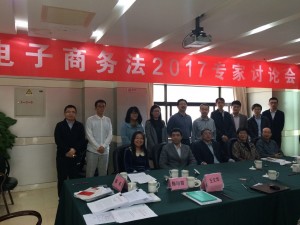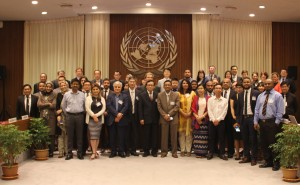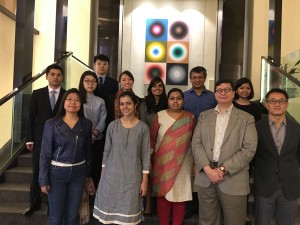November 1, 2017 at 8:20 pm
· Filed under Archives, Conferences, JCP: Joint Certificate Program on International E-Commerce Law, Legal News
 《中华人民共和国电子商务法(草案)》(简称草案)于2016年12月25日提交全国人大常委会首次审议,十二届全国人大常委会第三十次会议于2017年10月31日对“电子商务法草案”进行了第二次审议。 本着遵循规范经营与促进发展并重、聚焦于规范电子商务经营者特别是平台经营者、按照“鼓励创新、包容审慎”的原则,二次审议稿草案规定,电子商务经营者应当依法办理工商登记,但销售自产农副产品、销售家庭手工业产品、个人利用自己的技能从事依法无须取得许可的便民劳务活动以及依照法律、行政法规不需要进行工商登记的除外。 电子商务经营者是否需要依法办理工商登记,一直是社会讨论的焦点话题,有意见认为,应当促进电子商务经营的发展,扩大免于工商登记的范围。但也有意见认为,工商登记是税收征管的基础,而且工商登记、税务登记已合并,实行一照一码,工商登记应当线上线下统一。全国人大法律委员会研究后,对免于工商登记的范围作了修改。草案着重对加强消费者权益保护进行了修改和完善,规定不得以虚假宣传、虚构交易、编造用户评价等方式侵害消费者的知情权,应当明示用户注销的方式和程序,对于竞价排名的商品或者服务,应当显著标明“广告”。同时,草案还规定,电子商务平台不得利用服务协议和交易规则等手段,对平台内经营者的交易、交易价格等进行不合理限制或者附加不合理交易条件,或者收取不合理费用。此外,草案还完善了电子商务争议处理规范,经营者应当提供原始合同和交易记录,丢失、伪造、篡改、隐匿或拒绝提供的,应当承担相应责任。预计《电子商务法》将于2018年3月两会期间第三次审议并通过。
《中华人民共和国电子商务法(草案)》(简称草案)于2016年12月25日提交全国人大常委会首次审议,十二届全国人大常委会第三十次会议于2017年10月31日对“电子商务法草案”进行了第二次审议。 本着遵循规范经营与促进发展并重、聚焦于规范电子商务经营者特别是平台经营者、按照“鼓励创新、包容审慎”的原则,二次审议稿草案规定,电子商务经营者应当依法办理工商登记,但销售自产农副产品、销售家庭手工业产品、个人利用自己的技能从事依法无须取得许可的便民劳务活动以及依照法律、行政法规不需要进行工商登记的除外。 电子商务经营者是否需要依法办理工商登记,一直是社会讨论的焦点话题,有意见认为,应当促进电子商务经营的发展,扩大免于工商登记的范围。但也有意见认为,工商登记是税收征管的基础,而且工商登记、税务登记已合并,实行一照一码,工商登记应当线上线下统一。全国人大法律委员会研究后,对免于工商登记的范围作了修改。草案着重对加强消费者权益保护进行了修改和完善,规定不得以虚假宣传、虚构交易、编造用户评价等方式侵害消费者的知情权,应当明示用户注销的方式和程序,对于竞价排名的商品或者服务,应当显著标明“广告”。同时,草案还规定,电子商务平台不得利用服务协议和交易规则等手段,对平台内经营者的交易、交易价格等进行不合理限制或者附加不合理交易条件,或者收取不合理费用。此外,草案还完善了电子商务争议处理规范,经营者应当提供原始合同和交易记录,丢失、伪造、篡改、隐匿或拒绝提供的,应当承担相应责任。预计《电子商务法》将于2018年3月两会期间第三次审议并通过。
参与草案起草工作的北京师范大学互联网法律与政策研究中心主任薛虹于12月23日向中新社记者表示,该草案是世界首部综合性的电子商务法案,有望引领此领域的立法潮流。联合国于1996年12月16日出台首部《电子商务示范法》(UNCITRAL Model Law on Electronic Commerce),世界电子商务立法迎来“破冰”。“该法堪称电子商务立法的‘1.0版本’”,薛虹说。此后,欧美主要经济体都照此制定了类似法律,可以称为“2.0版本”。时隔20年,世界电子商务的发展与之前已经不能同日而语,中国在此领域的发展也已经达到全球前列高度。“中国根据新的变化和要求进行立法,有望成为世界电子商务立法的‘3.0版本’,起到示范作用”,薛虹说。
她认为,从国际视角来看,草案主要有三方面特点。一是全面吸收借鉴了全球电子商务立法的经验,并体现了中国立法的“原创智慧”。如草案赋予了第三方电子商务平台法律地位,并创造性地规范与监管电子商务平台的信用管理机制、在跨境电子商务综合服务者方面设立相关规定。“这都是世界现有法律没有的,体现了中国立法的原创性”,薛虹说。
二是在草案中,中方明确了愿意参与构建相关国际法律的态度。如草案第七十三条规定,国家推动建立与不同国家、地区间跨境电子商务的交流合作,参与电子商务国际规则的制定。薛虹说,这从立法领域体现出中国的开放态度,中国今后在电子商务领域将更深度融入世界。
三是目前看,中国电子商务法草案是世界此领域首部综合性立法,对于其他国家尤其是发展中国家的立法起到积极的示范作用。薛虹表示,经过20年的发展,世界上主流国家对于电子商务的规范还停留在一些分门别类的条款中,如有的单独对电子交易进行规范、有的单独对交易平台进行规范。“而中国在立法之初,就将与电子商务有关的领域都考虑进去,是立法体例的创新。”
草案对与电子商务有关的领域都作出了规范,如电子支付、快递物流等内容都被纳入其中,并在争议解决、市场秩序与公平竞争、知识产权保护、个人信息保护等方面作出了相关规定。
薛虹说,此次在立法过程中,起草组充分听取各方意见,先后召开两次国际研讨会,并将草案翻译成英文,邀请联合国国际贸易法委员会和美国、欧盟、日本、新加坡等国专家进行研讨,在此基础上进行丰富和修改。
“草案英文版公布后在一些国家引起了强烈反响”,薛虹说,许多发展中国家的专家看过后表示,现在要学习的不再是20年前的联合国示范法,而是要学习中国的做法。“这也是中国对于全球电子商务立法的主要贡献。”
中新社北京12月23日电 (记者 梁晓辉) http://www.chinanews.com/gn/2016/12-23/8102740.shtml
网易财经 http://money.163.com/16/1223/11/C8VGTTTL00254TI5.html#from=keyscan
东方头条 http://mini.eastday.com/a/161223114952654-2.html
法制网 http://www.legaldaily.com.cn/index/content/2016-12/27/content_6932482.htm?node=20908
Permalink
October 27, 2017 at 4:01 pm
· Filed under Archives, Conferences, Legal News, Privacy
![IMG_0049[1]](http://wiki.iipl.org.cn/wp-content/uploads/2017/10/IMG_00491-300x225.jpg)

 Organizer’s Thank-You Letter to Professor Hong Xue
Organizer’s Thank-You Letter to Professor Hong Xue
39th International Conference of Data Protection and Privacy Commissioners (“ICDPPC”) was held on 25-29 September 2017 at Kowloon Shangri-La Hotel, Hong Kong. This Conference was hosted by the Government of the Hong Kong Special Administrative Region, as one of the events celebrating the 20th anniversary of the establishment of the Hong Kong Special Administrative Region of the People’s Republic of China. The ICDPPC was first convened in 1979 and has been the annual premier global frum for data protection authorities for over three decades. The Conference seeks to provide leadership at international level in data protection and privacy and links more than a hundred privacy and data protection authorities from across the globe. The 39th ICDPPC comprised a comprehensive 4-day programme consisting of a closed session for the accredited members of ICDPPC and an open session attended by all in the data protection community including data controllers, privacy related enterprises, business entities, professionals and academia. More than 750 delegates from over 60 countries or regions attended the event where renowned practitioners and entrepreneurs from around the world joined as speakers and panelists to share their wisdom. The 39th ICDPPC was hailed as the prime arena and excellent platform for all international and local stakeholders to pick one and another’s expertise and map out the future privacy landscape.
Prof. Xue was invited to give the keynote speeches both at the Open Forum “Notice and Consent-From India to Japan” and the workshop “Privacy and Encryption in Digital Age”. Prof. Xue summarized the latest legal and practical developments in Asia Pacific Region and made indepth analysis on the relevant topics.
The thank-you-letter from Mr Stephen Wong, Privacy Commissioner for Personal Data, HKSAR is attached.
Permalink
September 15, 2017 at 3:24 pm
· Filed under Archives, Conferences, Internet Governance, JCP: Joint Certificate Program on International E-Commerce Law, Legal News
Gratitude Letter_Prof. Hong Xue
![IMG_0400[1]](http://wiki.iipl.org.cn/wp-content/uploads/2017/09/IMG_04001-300x225.jpg) ESCAP, ADB and the Coordinating Ministry of Economic Affairs Indonesia organized the 8th Asia-Pacific Trade Facilitation Forum from the 5-8 September 2017 in Yogyakarta, Indonesia. The theme for this year’s APTFF is Trade Facilitation Innovations for Sustainable Development in Asia and the Pacific. The Asia-Pacific Trade Facilitation is the leading regional platform for the exchange of information, experiences and practice on trade facilitation. The APTFF has been organized by UN ESCAP and ADB and growing number of partners since 2009. The Forum attracts over 250 participants from over 30 countries. This year’s Forum featured panel discussions, interactive sessions and an exhibition highlighting innovations and trends in trade facilitation in the Asia-Pacific region. The Forum also included a number of side-events providing more in-depth exploration of the pertinent trade facilitation issues. These events are held to maximize learning and capacity building on trade facilitation of participants attending the Forum. While the nature and number of side events vary every year, they generally include a study tour organized by the host country, as well as technical workshops co-organized with the United Nations Network of Experts for Paperless Trade in Asia and the Pacific (UNNExT), WCO or other members of the Global Facilitation Partnerships for Trade and Transport (GFP).
ESCAP, ADB and the Coordinating Ministry of Economic Affairs Indonesia organized the 8th Asia-Pacific Trade Facilitation Forum from the 5-8 September 2017 in Yogyakarta, Indonesia. The theme for this year’s APTFF is Trade Facilitation Innovations for Sustainable Development in Asia and the Pacific. The Asia-Pacific Trade Facilitation is the leading regional platform for the exchange of information, experiences and practice on trade facilitation. The APTFF has been organized by UN ESCAP and ADB and growing number of partners since 2009. The Forum attracts over 250 participants from over 30 countries. This year’s Forum featured panel discussions, interactive sessions and an exhibition highlighting innovations and trends in trade facilitation in the Asia-Pacific region. The Forum also included a number of side-events providing more in-depth exploration of the pertinent trade facilitation issues. These events are held to maximize learning and capacity building on trade facilitation of participants attending the Forum. While the nature and number of side events vary every year, they generally include a study tour organized by the host country, as well as technical workshops co-organized with the United Nations Network of Experts for Paperless Trade in Asia and the Pacific (UNNExT), WCO or other members of the Global Facilitation Partnerships for Trade and Transport (GFP).
Prof. Xue presented on legal impact of international digital trade at the Session 3 Facilitating Trade Behind the Border: Creating an Enabling (Business) Environment for Cross-border trade on September 6, 2017. She also participated in the UNNExT Advisory Committee Meeting. On September 7, 2017, Prof. Xue moderated the UNCITRAL Side Event “Taking FTA Electronic Commerce Chapters Seriously: UNCITRAL Texts for Mutual Recognition of Electronic Communications and Signatures” and actively contributed to the Panel’s discussion and Q&A.
Permalink
September 1, 2017 at 10:40 am
· Filed under Archives, Conferences, Legal News

The United Nations Framework Agreement on Facilitation of Cross Border Paperless Trade in Asia and the Pacific (Framework Agreement) has been adopted after three member states of UNESCAP , China, Bangladesh and Cambodia, deposited their signatures before September 1, 2017, the period open for signatures. According to the Framework Agreement, it will become effective after 5 member states ratify it.
This treaty is the first regional agreement of its kind to specifically focus on developing digital trade facilitation measures to achieve paperless trade across borders. Open to all 53 member States of ESCAP, the new treaty will support the WTO Trade Facilitation Agreement, which entered into force in February 2017. It is also expected to help harmonize the growing number of bilateral and subregional paperless trade initiatives in the region. Prof. Xue’s paper “The Newest UN Treaty to Facilitate Cross-border Paperless Trade in Asia and the Pacific: An Insight Preview” dedicated to the agreement has been formally accepted for publication on the prestigious SSCI Journal of World Trade and will be availed online and physically in December 2017 in Geneva.
Prof. Xue, as the invited legal expert, took part in the both the Legal and Technical Working Group (IISG) meeting and the 3rd meeting of the Intergovernmental Steering Group on Cross-border Paperless Trade Facilitation on the 21-24 March 2017 in Bangkok, Thailand. Significant progress was made on a draft road map for implementation of the Framework Agreement on Facilitation of Cross Border Paperless Trade in Asia and the Pacific. Prof. Xue gave a presentation on the international laws that are essential or complementary to the Framework Agreement at the Working Group meeting and her draft on implementation of Article 10 of the Framework Agreement was officially accepted as the supporting document for implementing the Road-map at the IISG meeting. Senior officials from 26 countries in the Asia-Pacific region participated in the Steering Group’s deliberations.
The Steering Group made significant improvement on a draft roadmap which outlines actions for successful implementation of the treaty. The Steering Group also agreed on a signing ceremony of the treaty to be held in August 2017. The text of the new treaty was adopted in May 2016 and opened for signature in New York later that year.
Permalink
March 1, 2017 at 10:29 am
· Filed under Archives, Conferences, Intellectual Property, Internet Governance, Legal News
 IIPL has been working diligently with its research partner Indian Center of Internet and Society (CIS) on the Issues in Mobile Internet and Access to Knowledge. The joint project has been going for two years. A couple of research exchanges, in-person meetings or virtual calls, have been arranged. Both parties have been working on four chapters on copyright, licensing, patent and anti-trust related issues on the Mobile Internet respectively in Chinese and Indian legal environment. A comprehensive review meeting was held at end of February 2017 in Macau, with the support of local research institutions. At the review meeting, both Chinese and Indian researchers of each chapter made the in-depth presentation on research methodology, progress and outlines of the contents. Prof. Xue presented, on behalf of the Chinese team, on all four chapters that have been working on from the Chinese side. 7 India young researchers presented respectively the chapters from the Indian side. International experts from Canada ICTSD and USA were invited to review the research and highly acknowledged the quality and value of the outputs.
IIPL has been working diligently with its research partner Indian Center of Internet and Society (CIS) on the Issues in Mobile Internet and Access to Knowledge. The joint project has been going for two years. A couple of research exchanges, in-person meetings or virtual calls, have been arranged. Both parties have been working on four chapters on copyright, licensing, patent and anti-trust related issues on the Mobile Internet respectively in Chinese and Indian legal environment. A comprehensive review meeting was held at end of February 2017 in Macau, with the support of local research institutions. At the review meeting, both Chinese and Indian researchers of each chapter made the in-depth presentation on research methodology, progress and outlines of the contents. Prof. Xue presented, on behalf of the Chinese team, on all four chapters that have been working on from the Chinese side. 7 India young researchers presented respectively the chapters from the Indian side. International experts from Canada ICTSD and USA were invited to review the research and highly acknowledged the quality and value of the outputs.
Four pairs of the chapters from both countries showcase the very interesting landscape and potential of mobile Internet in two biggest Internet communities in the world. Both opportunities and caveats emerge from these research outputs. The upcoming comparative studies will be even more inspiring. The research is an epic one in both countries as well as in the whole world. Its final product will be an importance contribution to the research on the Internet 2.0 that is community-based, social-media centered and ubiquitous on wireless network. The two partners is going to present its research achievements to the regional community at the APrIGF at the end of July 2017.
Permalink
 《中华人民共和国电子商务法(草案)》(简称草案)于2016年12月25日提交全国人大常委会首次审议,十二届全国人大常委会第三十次会议于2017年10月31日对“电子商务法草案”进行了第二次审议。 本着遵循规范经营与促进发展并重、聚焦于规范电子商务经营者特别是平台经营者、按照“鼓励创新、包容审慎”的原则,二次审议稿草案规定,电子商务经营者应当依法办理工商登记,但销售自产农副产品、销售家庭手工业产品、个人利用自己的技能从事依法无须取得许可的便民劳务活动以及依照法律、行政法规不需要进行工商登记的除外。 电子商务经营者是否需要依法办理工商登记,一直是社会讨论的焦点话题,有意见认为,应当促进电子商务经营的发展,扩大免于工商登记的范围。但也有意见认为,工商登记是税收征管的基础,而且工商登记、税务登记已合并,实行一照一码,工商登记应当线上线下统一。全国人大法律委员会研究后,对免于工商登记的范围作了修改。草案着重对加强消费者权益保护进行了修改和完善,规定不得以虚假宣传、虚构交易、编造用户评价等方式侵害消费者的知情权,应当明示用户注销的方式和程序,对于竞价排名的商品或者服务,应当显著标明“广告”。同时,草案还规定,电子商务平台不得利用服务协议和交易规则等手段,对平台内经营者的交易、交易价格等进行不合理限制或者附加不合理交易条件,或者收取不合理费用。此外,草案还完善了电子商务争议处理规范,经营者应当提供原始合同和交易记录,丢失、伪造、篡改、隐匿或拒绝提供的,应当承担相应责任。预计《电子商务法》将于2018年3月两会期间第三次审议并通过。
《中华人民共和国电子商务法(草案)》(简称草案)于2016年12月25日提交全国人大常委会首次审议,十二届全国人大常委会第三十次会议于2017年10月31日对“电子商务法草案”进行了第二次审议。 本着遵循规范经营与促进发展并重、聚焦于规范电子商务经营者特别是平台经营者、按照“鼓励创新、包容审慎”的原则,二次审议稿草案规定,电子商务经营者应当依法办理工商登记,但销售自产农副产品、销售家庭手工业产品、个人利用自己的技能从事依法无须取得许可的便民劳务活动以及依照法律、行政法规不需要进行工商登记的除外。 电子商务经营者是否需要依法办理工商登记,一直是社会讨论的焦点话题,有意见认为,应当促进电子商务经营的发展,扩大免于工商登记的范围。但也有意见认为,工商登记是税收征管的基础,而且工商登记、税务登记已合并,实行一照一码,工商登记应当线上线下统一。全国人大法律委员会研究后,对免于工商登记的范围作了修改。草案着重对加强消费者权益保护进行了修改和完善,规定不得以虚假宣传、虚构交易、编造用户评价等方式侵害消费者的知情权,应当明示用户注销的方式和程序,对于竞价排名的商品或者服务,应当显著标明“广告”。同时,草案还规定,电子商务平台不得利用服务协议和交易规则等手段,对平台内经营者的交易、交易价格等进行不合理限制或者附加不合理交易条件,或者收取不合理费用。此外,草案还完善了电子商务争议处理规范,经营者应当提供原始合同和交易记录,丢失、伪造、篡改、隐匿或拒绝提供的,应当承担相应责任。预计《电子商务法》将于2018年3月两会期间第三次审议并通过。![IMG_0049[1]](http://wiki.iipl.org.cn/wp-content/uploads/2017/10/IMG_00491-300x225.jpg)


![IMG_0400[1]](http://wiki.iipl.org.cn/wp-content/uploads/2017/09/IMG_04001-300x225.jpg)

